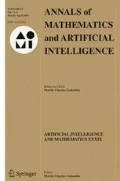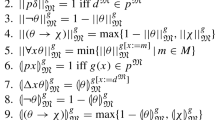Abstract
In nonmonotonic reasoning there are the problems of inconsistency and incoherence in general, and in default reasoning there may be only one trivial extension or no extension in special. We propose the restricted semantics of four-valued logic for default reasoning to resolve the problems of inconsistency and incoherence and in the meantime retain classical extensions in the presence of consistency and coherency. The restricted semantics can maintain both the expressiveness and reasoning ability of default logic. We provide a transformation approach to compute the restricted extensions by reducing them into classical ones.
Similar content being viewed by others
References
van den Akker, J., Tan, Y.H.: Qml: a paraconsistent default logic. Logique Anal. 143(143-144), 311–328 (1993)
Arieli, O.: Paraconsistent preferential reasoning by signed quantified boolean formulae. In: Proceedings of the 16th Eureopean Conference on Artificial Intelligence, ECAI’2004, including Prestigious Applicants of Intelligent Systems, pp. 773-777. PAIS 2004, Valencia (2004)
Arieli, O., Avron, A.: The value of the four values. Artif. Intell. 102(1), 97–141 (1998)
Arieli, O., Denecker, M.: Modeling paraconsistent reasoning by classical logic Eiter, T., Schewe, K.D. (eds.) , vol. 2284. Springer Berlin, Heidelberg. https://doi.org/10.1007/3-540-45758-5_1 (2002)
Arieli, O., Denecker, M.: Reducing preferential paraconsistent reasoning to classical entailment. J. Log. Comput. 13(4), 557–580 (2003)
Arruda, A.I.: Non-classical logics, model theory, and computability on the imaginary logic of n. a. vasil’év. Stud. Log. Found. Math. 89, 3–24 (1977). https://doi.org/10.1016/S0049-237X(08)70642-6
Belnap, Jr, N.D.: A useful four-valued logic. In: Modern uses of multiple-valued logic, pp. 5–37. Springer (1977)
Besnard, P., Schaub, T.: A simple signed system for paraconsistent reasoning. In: Proceedings of the European Workshop on Logics in Artificial Intelligence, JELIA ’96, pp. 404–416. Springer-Verlag, London (1996)
Besnard, P., Besnard, G., Ramon, S.: A default logic patch for default logic. In: Sossai, C., Chemello, G. (eds.) Symbolic and Quantitative Approaches to Reasoning with Uncertainty, Lecture Notes in Computer Science, vol. 5590, pp. 578–589. Springer Berlin, Heidelberg (2009). https://doi.org/10.1007/978-3-642-02906-6_50
Brewka, G.: Cumulative default logic: in defense of nonmonotonic inference rules. Artif. Intell. 50(2), 183–205 (1991)
Caminada, M.W., Carnielli, W.A., Dunne, P.E.: Semi-stable semantics. J. Log. Comput. 22(5), 1207–1254 (2011)
Costa, N.C.A.D.: On the Theory of Inconsistent Formal Systems. Notre Dame J. Form. Log. 15(4), 497–510 (1974)
Denecker, M., Marek, V.W., Truszczyński, M.: Uniform semantic treatment of default and autoepistemic logics. Artif. Intell. 143(1), 79–122 (2003)
Gottlob, G.: Complexity results for nonmonotonic logics. J. Log. Comput. 2(3), 397–425 (1992)
Han, Q., Lin, Z.: Paraconsistent default reasoning. In: 10th International Workshop on Non-Monotonic Reasoning (NMR 2004), pp. 197–203. Proceedings, Whistler (2004)
Lin, Z., Ma, Y., Lin, Z.: A fault-tolerant default logic. In: Fisher, M., van der Hoek, W., Konev, B., Lisitsa, A. (eds.) Logics in Artificial Intelligence, Lecture Notes in Computer Science., vol. 4160, pp. 253–265. Springer, Berlin Heidelberg (2006) https://doi.org/10.1007/11853886_22
Łukaszewicz, W.: Considerations on default logic: an alternative approach. Comput. Intell. 4(1), 1–16 (1988)
Papadimitriou, C.H., Sideri, M.: Default theories that always have extensions. Artif. Intell. 69(1), 347–357 (1994)
Pequeno, T.H.C., Buchsbaum, A.: The logic of epistemic inconsistency. In: Proceedings of the 2nd International Conference on Principles of Knowledge Representation and Reasoning (KR’91), pp. 453–460, Cambridge (1991)
Przymusinska, H., Przymusinski, T.C.: Stationary default extensions. Fundam. Inform. 21(1/2), 67–87 (1994)
Reiter, R.: A logic for default reasoning. Artif. Intell. 13(1), 81–132 (1980)
Rosati R: Model checking for nonmonotonic logics: algorithms and complexity. In: IJCAI, pp. 76–83 (1999)
Schaub, T.: On constrained default theories. In: Proceedings of the 10th European Conference on Artificial Intelligence, ECAI ’92, pp. 304–308. Wiley, New York (1992)
Verheij, B.: Two approaches to dialectical argumentation: admissible sets and argumentation stages. Proc. NAIC 96, 357–368 (1996)
Yue, A., Lin, Z.: A Coherent and Paraconsistent Variant of the Default Logic. In: Logical Formalizations of Commonsense Reasoning, Papers from the 2007 AAAI Spring Symposium, Technical Report SS-07-05, Stanford, pp. 162 (2007)
Yue, A., Ma, Y., Lin, Z.: Four-valued semantics for default logic. In: Lamontagne, L., Marchand, M. (eds.) Advances in Artificial Intelligence, Lecture Notes in Computer Science, vol. 4013, pp. 195–205. Springer, Berlin Heidelberg (2006). https://doi.org/10.1007/11766247_17
Acknowledgments
The preliminary version of this paper received the best paper award in KSEM 2015. We thank anonymous referees for valuable comments and related references.
Author information
Authors and Affiliations
Corresponding author
Additional information
The work is supported in part by Natural Science Fund of China under numbers 61672049/61732001 and Advance Programs Fund of Ministry of Education of China.
Rights and permissions
About this article
Cite this article
Lin, Z., Chen, C. Restricted semantics for default reasoning. Ann Math Artif Intell 84, 185–200 (2018). https://doi.org/10.1007/s10472-018-9592-z
Published:
Issue Date:
DOI: https://doi.org/10.1007/s10472-018-9592-z



